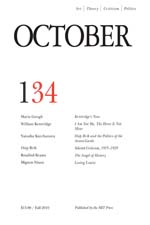October (journal)
 | |
| Discipline | Contemporary art |
|---|---|
| Language | English |
| Edited by | Adam Lehner |
| Publication details | |
| History | 1976–present |
| Publisher | MIT Press (United States) |
| Frequency | Quarterly |
| Standard abbreviations | |
| ISO 4 | October |
| Indexing | |
| ISSN | 0162-2870 (print) 1536-013X (web) |
| LCCN | 2001-213401 |
| JSTOR | 01622870 |
| OCLC no. | 47273509 |
| Links | |
October is an academic journal specializing in contemporary art, criticism, and theory, published by MIT Press.
History
[edit]October was established in 1976 in New York by Rosalind E. Krauss and Annette Michelson, who left Artforum to do so.[1][2] The founders of the journal were originally known as "Octoberists".[2] Its name is a reference to the Eisenstein film[2][3] that set the tone of intellectual, politically engaged writing that has been the hallmark of the journal. The journal was a participant in introducing French post-structural theory on the English-speaking academic scene.[2][4] According to The Art Story, Krauss used the journal "as a way to publish essays on her emergent ideas on post-structuralist art theory, Deconstructionist theory, psychoanalysis, postmodernism and feminism".[2] Jeremy Gilbert-Rolfe, one of the co-founders of the journal, withdrew after only a few issues, and by the spring of 1977, Douglas Crimp joined the editorial team. In 1990, after Crimp left the journal, Krauss and Michelson were joined by Yve-Alain Bois, Hal Foster, Benjamin H. D. Buchloh, Denis Hollier, and John Rajchman.[5]
Contents
[edit]As well as in-depth articles and reviews of 20th century and contemporary art, the journal features critical interpretations of cinema and popular culture from a progressive viewpoint.
Impact
[edit]According to Encyclopædia Britannica, the journal was an "influential vehicle for the debate surrounding the emergence of postmodernism and New Historicism in 20th-century art-historical studies", and the journal "contributed greatly to Anglo-American academics' adoption of French theoretical innovations, especially those pertaining to the analysis of cinema".[6] The Art Story describes the journal as "significant for revisiting and stressing the historical importance of early modes of 20th-century avant-garde art, such as Cubism, Surrealism and Expressionism".[2]
Collections
[edit]MIT Press has released two anthologies of articles[7][8] and a book series.
References
[edit]- ^ Smith, Roberta (24 July 2009). "Art or Ad or What? It Caused a Lot of Fuss". the New York Times. Retrieved 9 January 2016.
- ^ a b c d e f "The Art Story: Critic", Rosalind Krauss, retrieved 2016-01-09
- ^ Krauss, Rosalind; Michelson, Annette (Spring 1976), "About October", October, vol. 1, MIT Press, pp. 3–5, ISSN 0162-2870, JSTOR 778502
- ^ Cusset, François (2008). French Theory: How Foucault, Derrida, Deleuze, & Co. Transformed the Intellectual Life of the United States. U of Minnesota Press. ISBN 978-0-8166-4732-3.
- ^ "Mathias Danbolt, Front Room – Back Room: An Interview with Douglas Crimp", Trikster – Nordic Queer Journal #2, 2008, retrieved 2008-09-26
- ^ "Encyclopædia Britannica Online", Rosalind E. Krauss, retrieved 2016-01-09
- ^ Michelson, Annette; Krauss, Rosalind; Crimp, Douglas; et al., eds. (1987), October, the First Decade, The MIT Press, ISBN 0-262-13222-2
- ^ Krauss, Rosalind; Michelson, Annette; Bois, Yve-Alain; et al., eds. (1998), October, the Second Decade, The MIT Press, ISBN 0-262-11226-4, archived from the original on 2006-09-08, retrieved 2007-10-18
